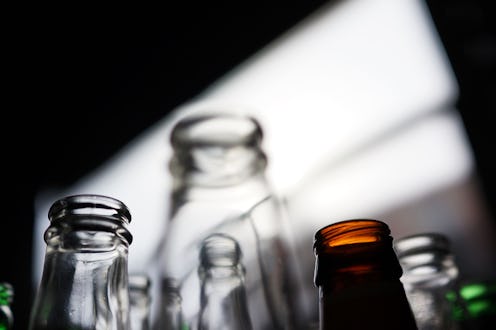News
7 Myths About Sexual Assault & Alcohol You Keep Hearing About The Kavanaugh Allegation

The furor surrounding the allegation from California researcher and professor Christine Blasey Ford about Supreme Court nominee Brett Kavanaugh has put alcohol-related sexual violence at the front of everyone's mind — but it's clear that there's a serious lack of understanding when it comes to the issue. Debunking myths about sexual assault and alcohol isn't just important for Ford and Kavanaugh. Many people drink, and studies have shown a high correlation between alcohol and sexual assault. It's important, therefore, to understand the facts when it comes to the link between the two.
Ford claimed to senators that Kavanaugh attempted to rape her back when the two of them were "stumbling drunk" at a house party while in high school, she told the Washington Post. Kavanaugh has "unequivocally" denied the accusation, saying through a statement released by the White House that he "did not do this back in high school or at any time."
The range of reactions to Ford's claims from Kavanaugh's defenders range from the category of "you can't hold someone accountable for what he did in high school" to "surely this is a tactic to stop him from getting elected" to "she's just 'mixed up'" (as reported in the Washington Post, Utah Sen. Orrin Hatch really did say that he believed Ford was "mixed up" and that someone else attempted to assault her).
Reactions like these rely on a number of myths about sexual violence, particularly sexual violence where alcohol is involved. Now, it's time to debunk those.
1MYTH: It's Not Rape If There's Alcohol Involved
The fact that a victim was drunk is often used to blame the victim — if he or she was drinking, then it was his or her fault for making the decision to drink. According to a study published in the Journal of Interpersonal Violence, over 50 percent of victims who "experienced an alcohol-related sexual assault" are told some version of this.
However, it's not at all true. Someone heavily under the influence of alcohol cannot consent to sexual activity, Teen Vogue reported, because alcohol inhibits the ability to make decisions and can even completely incapacitate someone who's had too much.
"Someone who is stumbling, unable to speak, and in and out of consciousness is absolutely not able to consent," Teen Vogue sex educator Lena Solow said. Although laws vary from state to state, many have it on the books that incapacitation from alcohol makes a person unable to consent, and therefore forcing sexual activity with them is assault.
2MYTH: If The Victim Didn't Report, The Sexual Violence Didn't Happen
Sexual violence is massively underreported, according to RAINN. If a victim didn't report her rape, that does not make it any less likely that it occurred.
According to another study published in the Journal of Interpersonal Violence, only about 35 percent of the victims of forcible rape report the crimes against them.
3MYTH: The Assault Is A Result Of The Victim's Choices
Any sexual violence that occurs is the fault of the perpetrator. Rape, attempted rape, or any other form of sexual violence is never the victim's fault, whether or not the victim has imbibed any alcohol.
4MYTH: If It Happened, The Victim Would Remember Everything
One particularly common trope is that a person's story can't be true if there are details she doesn't remember. According to sexual assault and forensic science experts Dr. James Hopper and Dr. David Lisak, though, it's entirely normal for a rape victim not to remember the circumstances of her attack perfectly — and also for her to remember certain elements of the story as if they happened the day before.
Alcohol in the equation can further complicate matters when it comes to the functioning of the brain, but the details that a person says they can't remember are not reason enough to call her whole story into question.
5MYTH: Drunken Sexual Violence Isn't That Common
On the contrary, sexual violence happens quite frequently when alcohol is involved. According to a study published in the Journal of Interpersonal Violence, over 70 percent of the women surveyed who reported to both consuming alcohol and being sexually active with male partners had experienced sexual violence.
According to another study published in the Criminal Justice Review, 70.8 percent of rape incidents on college campuses happened when the victim was intoxicated, and perpetrator appeared to be intoxicated in 54.2 percent of cases.
6MYTH: It's Not Sexual Assault If There Wasn't A Weapon
While some rapists do have weapons with them, this isn't always the case — and that happens even less frequently when the rape involves drugs or alcohol. According to a study published in the Journal of Interpersonal Violence, sexual assault against victims who had voluntarily consumed alcohol or drugs only involved a weapon 15.3 percent of the time.
7MYTH: Rapists Are Usually Strangers
In actuality, 70 percent of rapes are committed by people who know their victims, according to RAINN, and 45 percent of rapes are committed by acquaintances of their victims.
Drug-facilitated sexual assault is an all too common problem — so much so that it's almost surprising there are still so many myths to be debunked about it. However, the conversations that have taken place during Kavanaugh's nomination process show that there's still some learning that needs to happen.